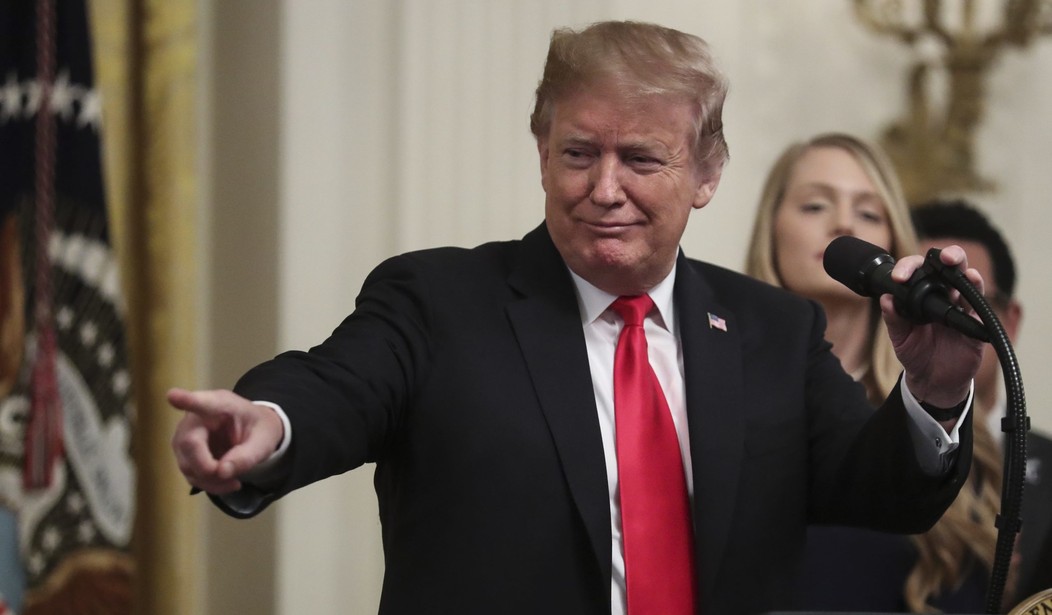Today’s jobs report was bad news for the good guys. At 75,000, May’s total of new jobs created was below the lowest estimate in the Bloomberg survey (but exactly where I forecast it would be in my June 5 Asia Times column). U.S. economic growth is slowing to a crawl, despite President Trump’s well-intended efforts to talk it up. He deserves all the credit for 2018’s economic boom. Tax cuts and deregulation revived the animal spirits of small business and pushed GDP growth above 3%. Now we’re looking at growth of around 1%, and that doesn’t necessarily get you re-elected.
I’m no free trader. I’ve argued for years that we need a massive defense driver for high-tech industry and an all-out national effort to claw back key industries from Asia. I applaud President Trump for declaring that things can’t go on as they have and for taking decisive action. Except it’s the wrong action, and it might lose him the election. I want a second term for Trump. He’s the only thing standing between the United States of America and the toxic sludge of identity politics that threatens to ruin our way of life. But the tools he’s chosen won’t get the results he wants.
America can’t produce most of the things we import from China. Apple’s Tim Cook explained:
There’s a confusion about China. The popular conception is that companies come to China because of low labor cost. I’m not sure what part of China they go to but the truth is China stopped being the low labor cost country many years ago. And that is not the reason to come to China from a supply point of view. The reason is because of the skill, and the quantity of skill in one location and the type of skill it is.”
The products we do require really advanced tooling, and the precision that you have to have, the tooling and working with the materials that we do are state of the art. And the tooling skill is very deep here. In the US you could have a meeting of tooling engineers and I’m not sure we could fill the room. In China you could fill multiple football fields.
We don’t have the engineers because American companies manufacture offshore. It would take us years to train a new generation of engineers. Only 7% of U.S. undergrads major in engineering. If that number doubled, we wouldn’t have the faculty, as Prof. Edward Dougherty of Texas A&M explained in a recent Asia Times essay. If we could build the plants, we could hire engineers, if we had some engineers. Of course, we can do all that: We can pass another National Defense Education Act, as Congress did in 1957 after the Sputnik shock, and we can begin the costly, disruptive business of bringing chip fabrication back to the U.S. with tax breaks and (perhaps) subsidies. If we can subsidize a sports stadium, we can do that for a chip fab. But it will take us time to do it. It won’t happen simply because the government taxes foreign goods to change their relative price.
In fact, nothing short of a full-scale national mobilization like the Apollo program or the Manhattan Project or the Strategic Defense Initiative will get us out of the hole. Tariffs don’t shift jobs back to the U.S. in most cases. They raise the cost of inputs. They raise costs to consumers. And they create uncertainty about future investments. If you’re General Motors, what would you be thinking? Now we’ve got tariffs on goods from China — better move production to Mexico. Oops, now we’ve got tariffs from Mexico — maybe we’d be better off waiting before we put brick on mortar.
That’s why the economy is weakening fast. We see it in purchasing managers’ surveys, retail sales, industrial production, and (now) employment.
Wonder why the U.S. stock market has been trading tick for tick with the Mexican peso all week? It’s not because anyone cares about the Mexican peso. It’s because every time Trump seems to back away from the ledge, both the peso and the U.S. stock market go up. I hope the president will figure out that tariffs are no quick fix for the long-term problems that ail America.












Join the conversation as a VIP Member